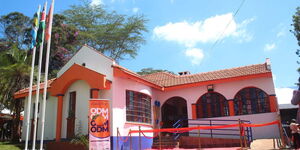The future of Kenya as is the case with every other nation, falls or rises on the vitality or vulnerability of its youth.
Unfortunately for Kenyans, a recent report by National Authority for the Campaign Against Alcohol and Drug Abuse (NACADA) reveals that there are high levels of drug addiction and trafficking among youth, particularly school-going children.
According to the survey dubbed "Status of Drugs and Substance Abuse among Primary School Pupils in Kenya, 2019," the number of children abusing prescription drugs, alcohol, bhang, and cigarettes is ballooning.
The report discloses that 16.9 per cent of primary school pupils are using at least one drug or substance of abuse.
Effects of drugs can be disastrous. Besides lowering academic performance, addiction predisposes the youth to increased risks of contracting infections.
If this dangerous trend is allowed, it could snowball into a national crisis.
This fight, therefore, calls for concerted efforts from all stakeholders.
In this article, we will focus on the role of NACADA in the fight against drug abuse and their contacts, just in case you might require their services.
Who is NACADA?
The National Authority for Campaign against Alcohol and Drug Abuse (NACADA) was established by an Act of Parliament in July 2012.
The Authority’s core function is to coordinate a mulch-sectoral public education and awareness campaign against alcohol and drug abuse in Kenya.
Previously, the Authority was known as the National Campaign Against Drug Abuse Authority established via Legal Notice No. 140 of 2007.
What is the function of NACADA?
1. Carrying out public education on alcohol and drug abuse directly and in collaboration with other public or private bodies and institutions;
2. Coordinating and facilitating public participation in the control of alcohol and drug abuse;
3. Coordinating and facilitating inter-agency collaboration and liaison among lead agencies responsible for alcohol and drug demand reduction;
4. In collaboration with other lead agencies, facilitating and promoting the monitoring and surveillance of national and international emerging trends and patterns in the production, manufacture, sale, consumption, trafficking, promotion of alcohol and drugs of abuse;
5. In collaboration with other lead agencies, providing and facilitating the development and operation of rehabilitation facilities, programs and standards for persons with substance use disorders;
6. Subject to any other written law, licensing and regulating the operation of rehabilitation facilities for persons with substance use disorders;
7. Coordinating and facilitating in collaboration with other lead agencies and non-state actors the formulation of national policies, laws, and plans of action on control of alcohol and drug abuse and facilitating their implementation, enforcement, continuous review, monitoring and evaluation;
8. In collaboration with other public and private agencies, facilitating, conducting, promoting and coordinating research and dissemination of findings on data on alcohol and drug abuse and serve as the repository of such data;
9. In collaboration with other lead agencies, preparing, publishing and submiting an alcohol and drug abuse control status report bi-annually to both Houses of Parliament through the Cabinet Secretary;
10. To assist and support county governments in developing and implementing policies, laws, plans of action on control of drug abuse.
11. Carrying out such other roles necessary for the implementation of the objects and purpose of this Act and perform such other functions as may from time to time, be assigned by the Cabinet Secretary.
What drugs are commonly abused in Kenya?
Alcohol, tobacco, bhang and prescription drugs.
What are the classifications of drugs?
Drugs are classified chemically according to how they affect the brain and the body.
Common classifications include stimulants, depressants, hallucinogens, and opioids.
Here are the commercial and street names of commonly used illegal drugs:
Cannabinoids
a.) Marijuana: Blunt, dope, ganja, grass, herb, joint, bud, Mary Jane, pot, reefer, green, trees, smoke, sinsemilla, skunk, weed
b.) Hashish: Boom, gangster, hash, hash oil, hemp
Opioids
a.) Heroin: Diacetylmorphine: smack, horse, brown sugar, dope, H, junk, skag, skunk, white horse, China white; cheese (with OTC cold medicine and antihistamine)
b.) Opium: Laudanum, paregoric: big O, black stuff, block, gum, hop
Stimulants
a.) Cocaine: Cocaine hydrochloride: blow, bump, C, candy, Charlie, coke, crack, flake, rock, snow, toot
b.) Methamphetamine: Desoxyn: meth, ice, crank, chalk, crystal, fire, glass, go fast, speed
Club Drugs
MDMA (Methylenedioxymethamphetamine): Ecstasy, Adam, clarity, Eve, lovers' speed, Molly, peace, uppers
What is the relationship between alcohol, substance abuse & HIV/AIDS?
Alcohol inhibits the sense of prohibition. People end up engaging in unprotected sex.
The use of syringes by injecting drug users infuriates HIV contraction.
How long does bhang stay in the brain?
It takes two days to eleven weeks, although this varies depending on body mass index. To heavy smokers, it can be detected 30 days after.
What is NACADA doing on the issue of rehabilitation centres especially in rural areas?
NACADA is committed to:
1. Establish institutional and community-based counseling, treatment and rehabilitation services.
2. Develop national standards for treatment and rehabilitation services for chemically dependent persons.
This will include among other activities;
a.) Developing certification criteria for practitioners in ADA treatment and rehabilitation.
b.) Preparing and maintaining a register of licensed practitioners.
NACADA Board of Directors
The governance of NACADA is vested in the Board of Directors while day-to-day management is vested in the Chief Executive Officer.
The Board is responsible for NACADA’s strategy, oversight for financial prudence and accountability, internal audit, directions of programs and finance and administration.
Here are the members:
1. Lt. Col (Rtd.) Julius Ayub Githiri Chairperson NACADA
2. Ms. Margaret N. Moitallel Director/ Vice Chairperson NACADA
3. Mr. Victor G. Okioma, EBS Secretary/ Chief Executive Officer NACADA
4. Ms. Farida Rashid - Director NACADA
5. Mr. Peterson M. Mwai - Director NACADA
6. Mr. George Ogalo - Director NACADA
7. Mr. Vincent Mwasia Mutua - Director NACADA
8. Dr. Salwa Haithar - Medical Practitioners and Dentists Board Representative
9. Dr. Massa Hamisi - Head Anti- Narcotic Unit
10. Dr. Kepha Ombacho - Alternate Member to the Principal Secretary Ministry of Health
11. Mr. Arthur Osiya - Alternate Member to the Principal Secretary Ministry of Interior and Coordination of National Government
12. Moses Jonathan Ochieng - Kenya Scouts Association Representative
13. Mr. Pius Mutisya - Alternate Member to the Principal Secretary Ministry of Education, Science and Technology
NACADA contacts
1. NACADA Headquarters
NSSF Building 18th Floor, Eastern Wing, Block A
P.O. Box 10774 – 00100 Nairobi
Phone: +254 202721997
Email: info@nacada.go.ke
Website: www.nacada.go.ke
2. Nairobi/South Rift Regional Office
NSSF Building 16th Floor, Western Wing, Block A
P.O. Box 10774 – 00100 Nairobi
Phone: +254726004346
Website: www.nacada.go.ke
Email: nairobi@nacada.go.ke
3. Coast Regional Office
NSSF House, Northern Wing, 9th Floor,
Social Security House, Nkuruma Road, Mombasa
Phone: 0702094901 / 0202610155
Website: www.nacada.go.ke
Email. coast@nacada.go.ke
4. Central Regional Office
Regional Coordinators Office Nyeri, Block A, Ground Floor, Room 11
P.O Box 948-10100,
Nyeri Phone: 0703751601, 0202649720,
Website: www.nacada.go.ke
Email: central@nacada.go.ke
5. Nyanza Regional Office
Huduma Centre, Wing C, 1st Floor
P.O. Box 7783-40100 Kisumu,
Phone: 0702112559, 0770892136
Website: www.nacada.go.ke
Email: nyanza@nacada.go.ke
6. North-Rift Regional Office
KVDA Plaza, 12th Floor
P.O. Box 9217 – 30100 Eldoret
Office: 254-772 079 368 / 254-714 493 660
Website: www.nacada.go.ke
Email: northrift@nacada.go.ke












